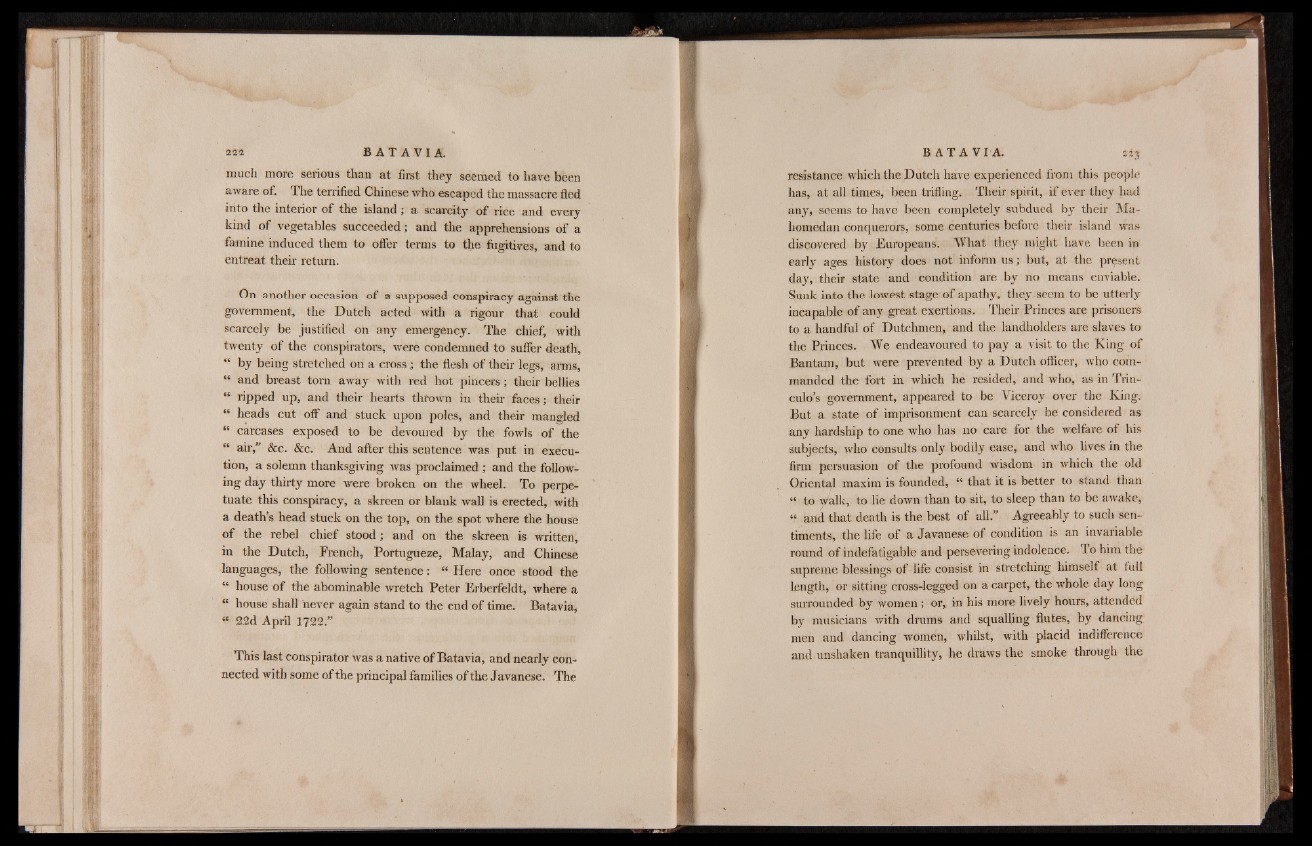
much more serious than at first they seemed to have been
aware of. The terrified Chinese who escaped the massacre filed
into the interior of the island; a scarcity of rice and every
kind of vegetables succeeded; and the apprehensions of a
famine induced them to offer terms to the fugitives, and to
entreat their return.
On another occasion of a supposed conspiracy against the
government, the Dutch acted with a rigour that could
scarcely be justified on any emergency. The chief, with
twenty of the conspirators, were condemned to suffer death,
“ by being stretched on a cross; the flesh of their legs, arms,
“ and breast torn away with red hot pincers; their bellies
“ ripped up, and their hearts thrown in their faces; their
“ heads cut off and stuck upon poles, and their mangled
“ carcases exposed to be devoured by the fowls of the
“ air,” &c. &c. And after this sentence was put in execution,
a solemn thanksgiving was proclaimed; and the following
day thirty more were broken on the wheel. To perpetuate
this conspiracy, a skreen or blank wall is erected, with
a death’s head stuck on the top, on the spot where the house
of the rebel chief stood; and on the skreen is written,
in the Dutch, French, Portugueze, Malay, and Chinese
languages, the following sentence: “ Here once stood the
“ house of the abominable wretch Peter Erberfeldt, where a
“ house shall never again stand to the end of time. Batavia,
“ 22d April 1722.”
This last conspirator was a native of Batavia, and nearly connected
with some of the principal families of the Javanese. The
resistance which the Dutch have experienced from this people
has, at all times, been trifling. Their spirit, if ever they had
any, seems to have been completely subdued by their Ma-
homedan conquerors, some centuries before their island was
discovered by Europeans. What they might have been in
early ages history does not infonn u s ; but, at the present
day, their state and condition are by no means enviable.
Sunk into the lowest stage of apathy, they , seem to be utterly
incapable of any great exertions. Their Princes are prisoners
to a handful of Dutchmen, and the landholders are slaves to
the Princes. We endeavoured to pay a visit to the King of
Bantam, but were prevented by a Dutch officer, who commanded
the fort in which he resided, and who, as in Trin-
culo’s government, appeared to be Viceroy over the King.
But a state of imprisonment can scarcely be considered as
any hardship to one who has no care for the welfare of his
subjects, who consults only bodily ease, and who lives in the
firm persuasion of the profound wisdom in which the old
Oriental maxim is founded, “ that it is better to stand than
“ to Walk, to lie down than to sit, to sleep than to be awake,
“ and that death is the best of all.” Agreeably to such sentiments,
the life of a Javanese of condition is an invariable
round of indefatigable and persevering indolence. To him the
supreme blessings of life consist in stretching himself at full
length, or sitting cross-legged on a carpet, the whole day long
surrounded by women; or, in his more lively hours, attended
by musicians with drums and squalfing flutes, by dancing
men and dancing women, whilst, with placid indifference
and unshaken tranquillity, he draws the smoke through the